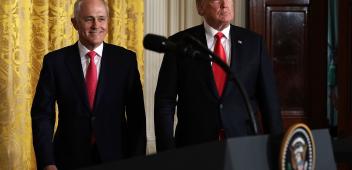Labor’s hard-won security credentials hang in the balance
Originally published in The Australian on 30 October 2023.

As security challenges mount, it’s politically untenable and strategically irresponsible for the Albanese government to maintain defence spending at just 2 per cent of gross domestic product.
In the six months since Defence Minister Richard Marles declared that Australia faced the most challenging set of strategic circumstances since World War II, a “polycrisis” of cascading, interconnected threats has worsened with the addition of the Middle East to the lengthening list of global flashpoints. The start of Israel’s much anticipated ground offensive doesn’t augur well for a speedy settlement of one the world’s most intractable conflicts.
An unwillingness to back its sober rhetoric with real money is undermining the government’s national security credentials at home and abroad. It now threatens to hollow out a defence force struggling to do more with less.
The core problem is that our nuclear-powered submarines will require an additional $368bn in defence spending over the next 20-30 years. But they are unfunded. Paying for them and the other enhancements flagged in April’s Defence Strategic Review won’t be possible without a major, sustained increase in the defence budget. The alternative is deep cuts to an already diminished defence force.
How did we get here? Under pressure to meet demands for increased spending on the caring economy and a structural budget deficit of worrying proportions, the government opted for a political fix, “repurposing” the existing defence budget while delaying necessary budget increases until after 2027. The worsening polycrisis has exposed this sleight of hand. The risk that the Israel-Hamas conflict could explode into a wider regional conflict with global consequences is forcing the US to pivot back to the Middle East. This will increase pressure on Australia to step up and commit more resources to national security.
Despite the bonhomie and positive optics of the Prime Minister’s visit to the US, American officials and strategic commentators are privately critical of the yawning gap between Anthony Albanese’s robust declaratory statements and the plateauing of defence spending, which contrasts sharply with other US allies. After the US spent fruitless decades cajoling reluctant European allies to increase spending to 2 per cent of GDP – once considered the minimum requirement for meaningful self-defence – Russia’s invasion of Ukraine has turbocharged European defence spending.
According to an analysis by Foreign Policy magazine, only three of NATO’s members met the alliance’s 2 per cent guideline a decade ago. Thanks to the Putin effect, nine NATO countries now meet this benchmark, and 24 plan to meet it by next year.
In our own region, we are well down the spending table. Nine countries allocate more to defence than Australia as a proportion of GDP, 10 if Taiwan is counted. Six, including Taiwan, spend more than 2.5 per cent with North Korea (33 per cent) and China (an estimated 4 per cent) leading the way. Even traditionally pacifist Japan has committed to doubling its defence spending by 2027.
After a strong start on foreign policy and national security, a counter-narrative is emerging: that Labor has failed to deliver on defence; is conflicted on Israel and AUKUS, and; is prepared to trade off strategic interests in its desire to win kudos for repairing relations with China.
The decision to allow Chinese-controlled firm Landbridge to retain the lease on the Port of Darwin feeds the perception that Labor is susceptible to China’s blandishments and hasn’t gone down well in Washington.
If these perceptions are allowed to grow – and they will certainly be exploited by the Coalition – Labor’s hard-won national security credentials may quickly turn into an election-jeopardising negative.
The smart play for Albanese would be to make a substantial down payment in next year’s budget on a commitment to increase defence spending to 3 per cent of GDP. This would have an immediate and salutary effect, rebutting criticism that the government is all talk and no action by providing a credible financial pathway to the DSR’S implementation.
Money alone won’t solve all the ADF’s mushrooming problems. But it’s the answer to most of them.
Despite all the hype about developing a lethal, fit-for-purpose military, the ADF is years away from attaining the capabilities it needs. In fact, it’s gone backwards in terms of personnel numbers, the surface fleet and the mobility and protection needed for our troops. Unless rectified, the government will come to regret its flawed decision to axe most of the army’s promised infantry fighting vehicles.
We still have too much of our military capital tied up in small numbers of exquisite, expensive systems that are vulnerable to cheap drones, missiles and loitering munitions, a problem we share with the US. We can’t compete with China’s unsurpassed ability to churn out large numbers of ships, planes, submarines and missiles because the West has collectively run down its once leading defence industrial base. The answer is to innovate by reintroducing mass into our systems building on the technological strengths of the private sector.
This is the purpose of an ambitious new Pentagon initiative named Replicator. Georgetown national security expert Lauren Kahn describes Replicator as an attempt to branch out from “a sole dependency on a limited number of expensive, often crewed assets”. The idea is “to make space for complementary, more cost-effective uncrewed systems” that can be scaled up quickly to produce mass. Think swarms of low-cost drones produced in sufficient numbers to overwhelm even the most sophisticated defences.
We need our own Replicator. But this will require a shift in mindset and defence culture, which is still too wedded to incremental improvements of existing systems.
Such change needs to be driven from the top. Concerns are growing that Marles has been captured by Defence. He should take a lesson from long-serving former Labor defence minister Kim Beazley, who was always open to challenging the prevailing orthodoxy.
Alan Dupont is chief executive officer of geopolitical risk consultancy the Cognoscenti Group and a non-resident fellow at the Lowy Institute.



